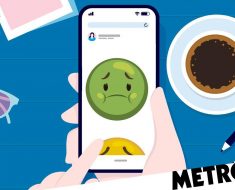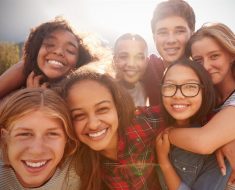BI
- Janice Martellucci is the managing director and lead teacher for Peace in Schools, a nonprofit that brings mindfulness education to public schools in Portland, Oregon.
- Martellucci teaches mindfulness courses, helping students become more present and less anxious. The classes even help students process trauma.
- Martellucci told Insider that she sees her work improving students' and teachers' lives every day, and that LGBTQ, BIPOC, and students who have experienced trauma are benefiting from the program the most.
- "I don't think it's an overstatement to say that mindfulness saves lives," Martellucci said.
- Martellucci is on Insider's list of Doers: 25 trailblazers creating hope and inspiring us. Check out the full list here.
- Visit Insider's homepage for more stories.
The first thing you see when you walk into one of Janice Martellucci's classrooms is a group of teenagers sitting on the floor in a circle. They've come from an academic class and tossed aside backpacks full of geometry homework to settle in on yoga mats and cushions.
"We begin with a mindful minute, which is basically a brief meditation," Martellucci, the managing director and lead teacher for the nonprofit organization Peace in Schools, told Insider. At 31, Martellucci's long hair and freckled face exudes a youthful energy that's hard to miss.
"Then we do a check-in and go around the circle. It's a big way that we build trust throughout the courses — just everyone getting a chance to be seen and heard without any requirements to share," she said.
Peace in Schools, which has been around since 2014, created the country's first for-credit high-school mindfulness course.
Mindfulness is a practice of intentionally living in the present. Practitioners use breathing exercises, yoga, and meditation to process their feelings and experiences without judgment. It's proved to alleviate anxiety and can even help people better deal with pain.
The sense of trust created in Peace in Schools classrooms is even more important now, as the staff tries to help students process things happening in the world around them — the coronavirus pandemic, for example, and the recent Black Lives Matter protests.
"If something happens in the community or the world, we integrate it into our classes," Martellucci said. The courses give students a space to process the complex emotions they have about how these events impact them. Mindfulness can help to ground them when the external world feels out of their control.
"Right now, teens have nothing to hang on to," she said, pointing to the uncertainty of our current moment. "If we look outwards, there's nothing to make us feel stable, safe, secure, or optimistic about the future. So the class is really about how we access the safety of our own selves."
Martellucci came to mindfulness in 2010, during what she calls her quarter-life crisis.
Her father was sick with cancer, she was having health problems of her own, and she had just fallen in love with a woman — who is now her wife — after 20 years of thinking she was straight.
"It was this period in my life where all of who I thought that I was and all the things that I had used to cope were changing, and it wasn't working anymore," she said.
Her initial reaction to all the change was anger. "I had no models of how to be with pain in a way that didn't create more of it for myself or for others," she said.
After she had a breakdown one night, a friend suggested she try mindfulness, and she decided to give it a chance. She agreed to go to a yoga class in Sacramento, California, where she met Caverly Morgan, who went on to found Peace in Schools. Morgan's presence and approach to the class moved Martellucci.
"It was the first moment that I thought and felt something that was possible that I didn't know was possible," she said.
Martellucci ended up studying under Morgan, meeting with her weekly to develop her mindfulness practices. She went on monthlong and weeklong silent retreats and participated in regimented formal training to fully embrace mindfulness.
Today, she said, her practice manifests in the way she treats her relationships and herself.
"It's no longer that I insert mindfulness practice into my life," she said. "It's that my entire life is a stage for my mindfulness practice."
She joined Peace in Schools as a staff member in 2015.
"When this opportunity came up, I jumped on it because it combined my two greatest passions: working in education with youths and mindfulness practice," Martellucci said. She also works with Presence Collective, a community group that hosts events, speaking engagements, and mindfulness sessions with the intention of dismantling white supremacy and other forms of oppression.
"I don't think it's an overstatement to say that mindfulness saves lives," Martellucci said.
Having courses available during the normal weekday is an important part of the mission of Peace in Schools.
"Our mission is essentially to make the tools of well-being accessible to all," Martellucci said. "What better way to do that than to do it from inside the public education system?"
Martellucci is glad mindfulness became part of her life when she was struggling, but she wishes she had access to it when she was a teenager. "I just would have loved the opportunity to love myself sooner," she said.
The program operates only out of Portland, Oregon, at the moment, but the organization hopes to become a nationwide endeavor at some point, according to Martellucci.
Since it was founded, the organization has grown to offer mindfulness meetups for teens and courses for educators in addition to its in-school programming, with Martellucci overseeing the teen and adult programs. The organization's mindfulness classes are available in nine public schools in Portland and reached 2,857 teens in the 2019-20 school year, according to its website.
Each mindfulness lesson has a verbal and physical portion, and yoga is often part of the coursework.
The classes vary, but there are common themes throughout them, such as a focus on community.
Abdelhak Senna/AFP/Getty Images
"Mindfulness can get a bad rap sometimes because it's perceived as just very individual, isolated practice, which it can be," Martellucci said. "But it's really important to us that it's relational and that we're connecting it to their lives, so we're connecting it to larger structures in society."
Peace in Schools has tangible evidence their programming helps students. According to research produced in partnership with Johns Hopkins University, students had a higher interest in attending school and were less anxious after taking mindfulness courses.
The classes have transitioned online since the advent of the pandemic and look a bit different, but the general setup is the same. A lesson still starts with a mindful minute, there's a check-in for the group, and the curriculum incorporates yoga.
Now, however, the instructors have deviated from their planned lessons to help students deal with the new problems they've found themselves facing during the pandemic — like feelings of isolation and anxiety about the future. Courses in the fall will be designed specifically to help students process trauma.
Martellucci can see the classes making life a bit easier for students as they struggle with online learning and the unknowns of their futures. One of the program's students wrote a blog post about her mindfulness courses amid the pandemic.
"Mindfulness taught me how to cope and know that it's OK to feel the things I feel," the student wrote. "The schedule in our mindfulness class was shortened and different, but not any less helpful. In fact it is more important than ever right now. Mindfulness and meditation helped me through a really hard time, and it is helping me again."
Martellucci hopes that mindfulness education can help people with their sense of self-worth and empathy.
"If we were in touch with everyone's inherent value and how we are connected intimately forever and always, and if we acted on behalf of that understanding, just imagine how different all of the moments, small and huge, would be," she said.
She said she gets glimpses of what that life could be like when she's with her 1-year-old son, and through her work.
"At the end of the day, we all want the same thing," Martellucci said. "We want to be seen. We want to be heard. We want to feel like we belong. We want to love and be loved."
You can learn more about Peace in Schools here, and you can follow Martellucci on Instagram.
Source: Read Full Article





